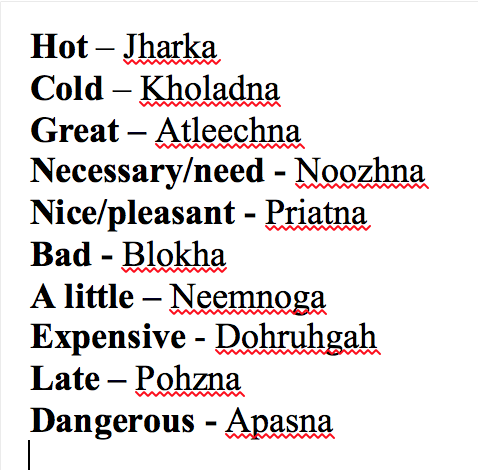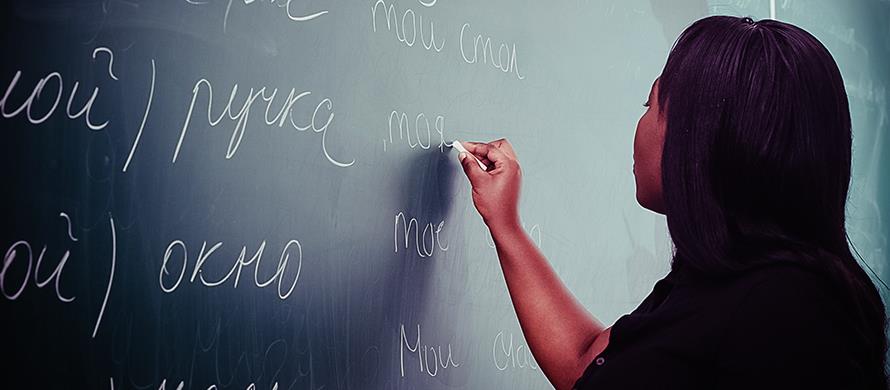Is Russian a hard language to learn?
According to the legend of Tower of Babel, there was the time when all people spoke one language. But being punished for the vanity, all the people got different languages. And ever since, we are not able to understand each other without spending days and nights learning other languages.
For someone studying a new language is a vital necessity, for others it is just a hobby. If you choose to study Russian language, you are going to have really hard times. And in this article you will find the proof.
Is Russian easy to learn?
No! Definitely not! The Russian language is pretty difficult for learning. Of course, it is not as complicated as in the case of Japanese or Arabic, but still, it requires lots of efforts.

Though, much depends on the source language you speak. Let me make it clear.
As you may know, all languages of the world are divided into language families that are subdivided into language groups. These groups are formed according to the ethnicity of the speakers, origin and similar features. It means that if your native language belongs to the same group of languages as Russian, it will be easier for you to study it. The Russian language belongs to the Slavic group of languages. So, if you speak any of the Slavic languages (Polish, Slovak, Serbo-Croatian) you can study Russian easily and even speak with a very little accent due to the similarity of sounds of speech.
But if you speak any of the Romance languages (Spanish, French, Italian) or Germanic language (German, English) you will have to fight with the grammar and pronunciation.

How hard is Russian to learn?
- Russian language for foreigners is pretty difficult to learn because of its grammar. It is tough, even though, there are only 3 tense groups in Russian: Present, Past and Future. At this place, good news for learners finishes. In Russian, verbs have the endings of gender, person and tense. Nouns, adjectives, and numerals have endings of gender, case and number. There are six main Cases in Russian. It is a bit mind-blowing, isn’t it?
- There are lots of prefixes and suffixes that can completely change the meaning of the words.
- The alphabet of Russian has 33 letters and it is called Cyrillic Script. It has some letters that similar to the English ones…but they denote different sounds.
- The word stock of the Russian language is really great. Russians themselves call their language “Great and mighty” because of this fact. The language is really old, that’s why you may come across different names of the same notion. In their turn, Russians, who study English, complain that in the English language one word may have a dozen of meanings. People are never satisfied, are they?
- Pronunciation is rather difficult for foreigners, but as it has been said before, it depends on the similarity with the language you already know.
- Idioms and set phrases. Russians love them, as well as to quote different phrases from well-known movies or lines from Russian classic books. Such things make the understanding complicated for a foreigner.
Having seen these difficulties, you may wonder how to teach foreigners Russian language. Actually, Russian is taught just like any foreign language.

Our blog prepared for you some useful tips how to study Russian:
- Move to Russia for some time. It is well known that the best way to study any language is to experience living in the country where this language is spoken. But there is one important condition: you have to communicate with the locals and immerse into the culture.
- Get Russian education in Russia. The easiest way is to enter the preparatory faculty of any university that trains foreign students. Such courses normally last around 9 months and you will have a certificate in addition to knowledge. Also you will be able to meet Russian students and make friends. New local friends will help you with the language practice.
- Attend language courses at any well-reputed language school. You can choose group or individual classes. You’d better choose a native speaker with a diploma of a teacher. Why? Being a native speaker does not imply the skills of a good teacher by default. As an option, you can try online lessons with a native speaker if you do not want to go to Russia at the moment.
- Watch movies and listen Russian music. If you already have basic knowledge of grammar and vocabulary, you must listen to the Russian speech because it will develop your skills of perception.
- Communicate with Russians. It will be really great if you have friends from Russia. Most likely that they will not explain you grammar rules, but they can teach you a real live speech that is so important in learning the language.
- Get a Russian wife. A funny idea as it is, but it really works. If you spend days and nights with a person you will know the language even without trying hard.
- Find a good motivation for you. It is true that motivation is a key to success. You must know why you need Russian and how fast you need to study it. Without a strong motivation you will give up the idea within a couple of months.
- Practice makes perfect. Use your new knowledge in all possible situations. Don’t wait for a special day, moon phase and so on.
As you see, Russian is a pretty hard language to learn, but not the most difficult one. Hence, with a decent amount of efforts, patience and a strong will, you will definitely succeed. Good luck to you!

Ernest Cooper is a renowned dating expert with over a decade of experience in the industry. He has helped thousands of men and women improve their dating skills and find lasting love. Ernest is known for his practical and down-to-earth approach to dating advice. He believes that finding love should be fun and enjoyable, not stressful and overwhelming. His methods are based on building confidence, improving communication skills, and developing a positive mindset.

